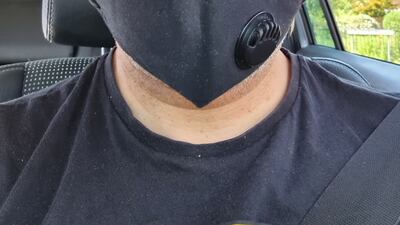Sixteen months after being put into an induced coma with a severe case of Covid-19, a former Dubai resident says he is still battling symptoms of the virus.
Now living in the UK, Sohail Anjum, 48, said he suffers from breathlessness, an erratic heart rate and fatigue after being on a ventilator for almost a month in the early stages of the outbreak.
Currently being cared for by specialist consultants in London for long Covid, the media professional has been on Bisoprolol, a beta blocker medication, since being discharged from hospital on May 1, 2020.
After losing his mother to the virus while he was in a coma, he said it has been a tumultuous 18 months.
British national
“I was on a ventilator for almost a month so my whole body essentially switched off,” Mr Anjum told The National.
“When I was finally discharged from hospital, I spent months trying to regain my strength.
“Then I developed these symptoms, like a Covid-19 cough, a phlegmy cough, for about five months.
“At times I still feel pain in my body, tingling in my legs and a rash or burning sensation on my arms. It’s been a battle but my three main symptoms are breathlessness, erratic heart rate and fatigue.”

Walking up stairs is a challenge
Fit and healthy before his Covid-19 diagnosis, Mr Anjum said it has been a tough journey but he remains positive that he will return to normal soon.
Simple tasks like walking up the stairs or to his local shop leave him gasping for breath, and trying to get his heart rate, which often reaches 140 beats per minute, under control.
He is now under the care of a respiratory and cardiology specialist at a London hospital.
During his most recent check-up, an X-ray showed that his lungs were almost fully recovered from a case of double pneumonia brought on by the virus.
“That pneumonia has been with me since I contracted the virus,” he said.

“Because most of the fluid had cleared up, they could see my lungs more clearly and noticed the left diaphragm was elevated much higher than it should be.
“They are unsure if this was a pre-existing condition or if the virus caused it and is contributing to my ongoing breathlessness.
“They’re investigating the issue so I hope to get some results soon.”
Mr Anjum’s case files have also been examined by a research team at the University of Edinburgh in Scotland, along with blood samples, as part of a study into Covid-19 and the long-term effects on patients.
Freedom Day in the UK
Baffled by the UK government’s decision to lift almost all Covid-19 restrictions on July 19, he said he is still “very cautious when out in public”.
He wears a double mask, carries hand sanitiser at all times, and says he feels anxious about the rising case numbers in the UK.
On July 19, dubbed “Freedom Day”, the UK government called on citizens to use “personal judgment and common sense” to protect themselves against the virus.
Nightclubs reopened across the country, big events' capacity limits were removed and wedding guest restrictions were lifted.
“The way they just announced it like we’re free, like the pandemic is over, it left me feeling uneasy,” he said.
“We have one of the highest case numbers right now and two of my friends were recently diagnosed with Covid-19, one with the Delta variant, and he is in intensive care in hospital.
“Rising case numbers prove that the threat is still very real and the scariest thing is the people who are asymptomatic.
“They won’t know they are infected so will spread it. If you look now on public transport it is half and half, some people wearing masks and some not. I think it’s too soon.”
Mr Anjum said his switch in lifestyle brought on by the pandemic has been a struggle, but more people are talking about long Covid, which has helped him cope better with his health issues.
He said there is a real need for health bodies to build infrastructure for centres of excellence that specialise in the effects of long Covid as it can be “very debilitating for the individual suffering from it”.
“Luckily I’m living in a place where people are talking about long Covid. There is infrastructure built to deal with it here but doctors are learning from patients like me, it's slow paced,” he said.
“Long Covid clinics need to be established all over the world because in my experience, people are not the same after they have been struck down by this virus, they need help and support.”





